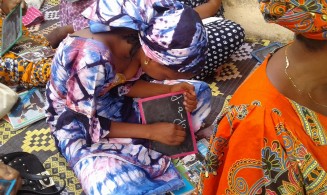

Repositioning literacy to meet the 2030 Education Agenda targets
Literacy and numeracy are key to achieving the 2030 Agenda for Sustainable Development yet estimates show that there are 757 million adults, including 115 million youth, who cannot read or write a simple sentence and two-thirds of them are women.
UNESCO and the UNESCO Institute for Lifelong Learning (UIL) is holding a consultation meeting at the Organization’s Headquarters in Paris on 26 February 2016 to discuss the establishment of a Global Alliance for Literacy (GAL) within the framework of lifelong learning.
‘The Global Alliance for Literacy is an ambitious attempt to make the major stakeholders work together to pull in the same direction to better support countries to achieve better,’ said Arne Carlsen, Director UIL.
The meeting will seek the views of Member States on the proposed alliance, which aims to help Member States achieve the literacy-related target of the Education 2030 Framework for Action. Sustainable Development Goal 4 seeks to “Ensure inclusive and equitable quality education and promote lifelong learning opportunities for all.” while Target 4.6 aims by 2030 to “ensure that all youth and a substantial proportion of adults, both men and women, achieve literacy and numeracy.”
The alliance will promote literacy as a foundation of lifelong learning, focusing on the innovative use of technology and the establishment of connections with the other Sustainable Development Goals.
At its 68th session (2013), the United Nations General Assembly (UNGA) expressed deep concern that the issue of literacy may not be sufficiently high on national agendas and recognized the importance of national programmes and measures to promote literacy worldwide. UNESCO was asked to strengthen its coordinating and catalyzing role.
The UNGA also encouraged UNESCO to continue consulting with Member States and development partners in order to elaborate a literacy vision and agenda for the years following the United Nations Literacy Decade (2003–2012).
In its 37th Session (2013), UNESCO’s General Conference resolved ‘to continue consultations with Member States and development partners in order to put in place a multi-stakeholder partnership for literacy that would ensure long-term global literacy efforts’.
Against this backdrop more than 100 UN and government representatives, donors, national and international non-governmental organizations, representatives of the private sector and experts from thirty-four countries gave their support to the proposal to create a GAL within the framework of lifelong learning.
This was detailed in the Paris Communiqué on Literacy and Sustainable Societies, which was adopted by the Global Meeting on Literacy and Sustainable Societies at UNESCO Headquarters in Paris on 8 and 9 September 2015. UIL has been tasked with leading the consultation process and establishing the alliance.





